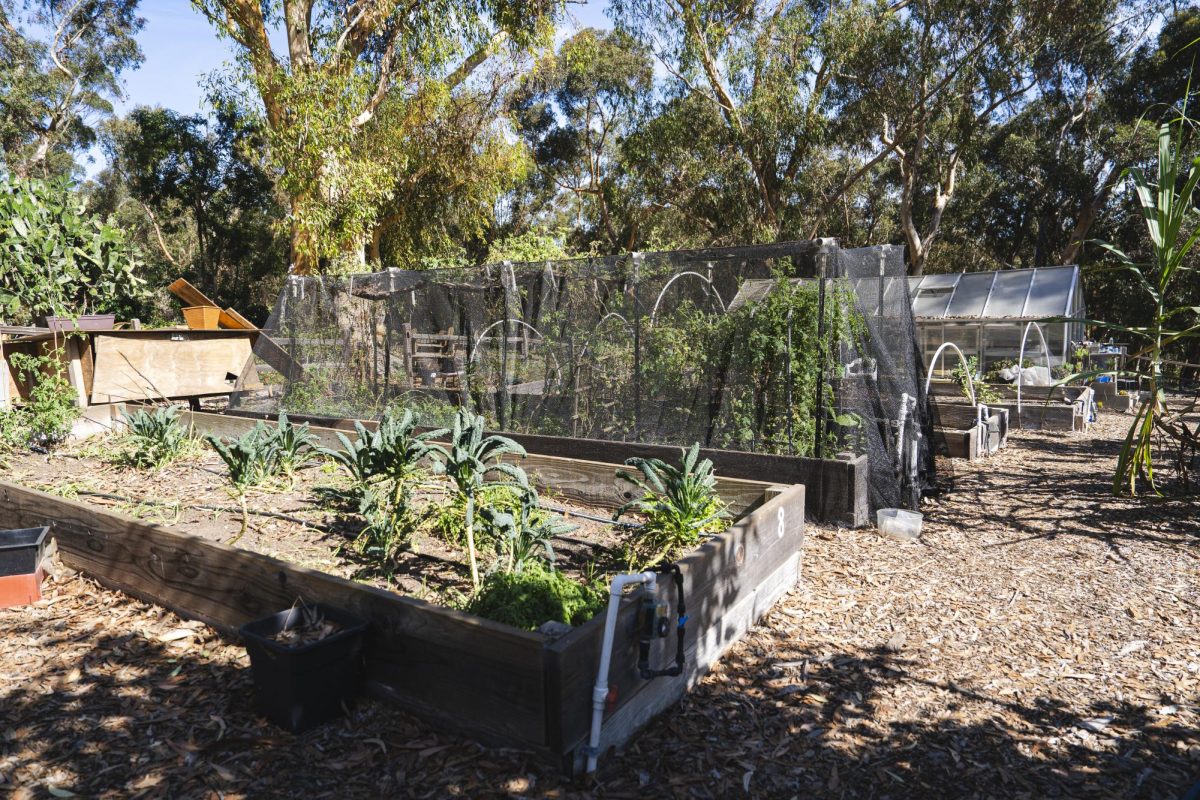Situated throughout UC San Diego’s campus are multiple community gardens where students can engage in gardening and sustainability activities. One of these gardens is Roger’s Community Garden, located behind the Ché Café in Revelle College.
RCG is a student-led community garden where volunteers meet weekly for maintenance and upkeep. In recent years, RCG has been working on innovative projects with the aim to combat food insecurity and develop sustainable farming practices on campus.
One of these projects is their aquaponics system which was initially built in 2015 but was rehabilitated in 2021 by “sifting gravel, filtering water, patching holes, and cultivating bacteria.”
George Nassar, a junior in Seventh College, is the aquaponics project lead at RCG and explained how the aquaponics system works. Aquaponics use fish tanks and the waste compounds of fish to create nitrate fertilizers as a form of farming.
“The plants take up that nitrate, and they keep the water clean for the fish, and the plants also use that fertilizer to grow,” Nassar said. “There’s hardly any input on our end aside from starting the system. All we do is feed the fish, and the system takes care of itself.”
This sustainable form of farming, which has been implemented effectively on campus, not only raises students’ awareness about sustainable agriculture but also shows the viability of alternative farming methods.
Another RCG farming project is its hydroponics system. In 2022, Housing Dining Hospitality gave the hydroponics towers behind the 64 Degrees dining hall to RCG. Hydroponics is a soilless and water-efficient farming method that uses water-based nutrient solutions to grow plants in a limited space. At RCG, they use vertical hydroponics towers that have trickle irrigation. The closed-off towers prevent evaporation and drainage loss, pumping the nutrient-rich water from the troughs up to the top of the tower, where it trickles down onto plant roots.
John Muir College sophomore Jacqueline Avery, who is the hydroponics project lead, described the process of maintaining and using the hydroponics system.
“And so for hydroponics, we go into the greenhouse to get seedlings started. We grow them there for three to five weeks so they have mature leaves when they move, and can handle sunlight or lack of and weather changes,” Avery said.
The hydroponic towers are currently working on growing broccoli, purple radishes, chili peppers, and chives.
Avery hopes that the hydroponics method utilized in the RCG will continue the cyclical production of more plants and seeds to further the yield of the system.
Avery sees a bright future for hydroponics systems in gardens.
“The hope is also to be able to produce more food that we can provide to the campus because the whole idealization of hydroponics towers is that they don’t use as much space in comparison to contemporary farming but can produce higher yields of food,” Avery said.
Along with hydroponics and aquaponics, RCG also works on composting, growing mushrooms, and taking care of fruit trees. Senior Camryn Morey is the arborist lead of the RCG. She and the other arborists mainly work on keeping the older trees healthy.
“A lot of the work we do is making sure that the trees are going to produce fruit and setting them up for success when people are gone over breaks,” Morey said. “Because we do have a lot of pests in the garden, we do have to worry about birds and squirrels taking ripe fruit as well as insects that will climb up the trees and make them infested. So we have to learn how to detect those things.”
To keep these many projects running, RCG has volunteer hours every week on Sundays from 10 a.m. to 2 p.m. The maintenance, growth, and upkeep of the entirely student-run garden bring the volunteers at RCG together. Students from sororities and fraternities come to volunteer for community service, and environmental systems majors volunteer for their capstone projects.
“We definitely rely on having a community of people who motivate each other to go and also bring in new people who don’t know a lot about gardening and be able to teach people about how to garden on their own,” Morey said.
As a community garden, RCG’s influence extends to other organizations and the school campus as a whole.
“We do a lot of distributions to the community, so either people who are just stopping by the garden, and we collaborate a lot with the Che Cafe,” Morey said. “They do a lot of community free food events for people who need it. So we often take our produce over to them and put it in their kitchen, and like they will use it over the next few weeks or so. We also do some work with the Triton Food Pantry.”
Beyond the resources they provide for student food security and UCSD organizations, RCG also serves as an educational space.
“As proof of concept for upscaling, researchers out there on campus who want to look at large-scale aquaponics farms can come to us as a vital resource,” Nassar said.
Morey emphasizes the educational value RCG provides for students.
“Everyone who comes, I feel like, is learning something,” Morey said. “So whether that be about how to be more sustainable with things like learning to compost, spreading awareness of sustainable farming, or trying to get students off-campus to reconnect with nature and seeing how to grow their own food, everyone can learn something from the garden.”
















